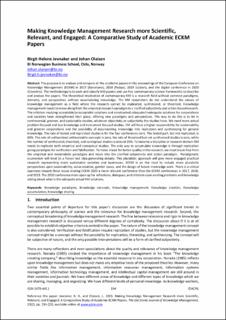| dc.description.abstract | The purpose is to analyse and compare all the academic papers in the proceedings of the European Conference on Knowledge Management (ECKM) in 2017 (Barcelona), 2018 (Padua), 2019 (Lisbon), and the digital conference in 2020 (Coventry). The methodology is to code and classify 440 papers and use five contemporary science frameworks to describe and analyse the papers. The theoretical implication of contemporary KM is a research field without common paradigms, domains, and perspectives without accumulating knowledge. The KM researchers do not understand the nature of knowledge management as a field where the research cannot be replicated, synthesized, or theorized. Knowledge management needs to move along from the empirical research paradigm to a clarified subjectivity and action-basedresearch. The criticism implying acceptable/unacceptable solutions and constructed adequate/inadequate solutions for corporations and societies have strengthened their place, offering new paradigms and perspectives. The way to do this is to let in controversial, greener, and sustainable studies, whatever objectivity or subjectivity the studies have. We need more actual problem focused and less knowledge and instrument focused studies. KM will have a higher responsibility for sustainability and greener corporations and the possibility of accumulating knowledge into replication and synthesizing for general knowledge. The rate of tested and replicated studies is for the four conferences zero. The tested part, but not replicated, is 80%. The rate of untheorized untheorizable concepts is zero, the rate of theorized but not synthesized studies is zero, while the number of synthesized, theorized, and conceptual studies is around 20%. To become a discipline or research domain KM needs to replicate both empirical and conceptual studies. The only way to accumulate knowledge is through replication giving paradigms for verification and falsification. To move ahead for better quality in the research, we must break free from the empirical and materialistic paradigms and move into the clarified subjectivity and action paradigm. Paradigmatic ecumenism will tend to a fiercer but idea-generating debate. This pluralistic approach will give more engaged practical research representing more sustainable societies and businesses. ECKM is on the road to include more pluralistic perspectives upon sustainability, value creation, gender issues, and the design of future knowledge work. There is a critical openness toward these issues making ECKM 2020 a more relevant conference than the ECKM conferences in 2017, 2018, and 2019. The 2020 conference more open up for reflections, dialogues, and criticism upon existing problems and knowledge asking about what is the adequate actual KM solutions. | en_US |

